Here is our list of the best problem solving games, activities and exercises for adults.
Problem solving games are activities that require players to use critical thinking skills to solve puzzles. Example activities include escape rooms, Sudoku, and murder mysteries. The purpose of these exercises is to sharpen reasoning and decision-making skills in group settings and to do team building with employees.
These activities are a subset of remote team games, found in problem solving books, and are similar to team puzzles, team building brain teasers and team riddles.

This article contains:
- team building problem solving activities for employees
- free problem solving games for adults
- virtual problem solving activities for students
- group problem solving activities
- problem solving team builders
Here we go!
List of problem solving games & activities
From word and number puzzles to role-playing games, here is a list of inexpensive and free problem solving team builders that help groups practice the art of critical thinking and compromise.
1. Espionage! (Team Favorite)
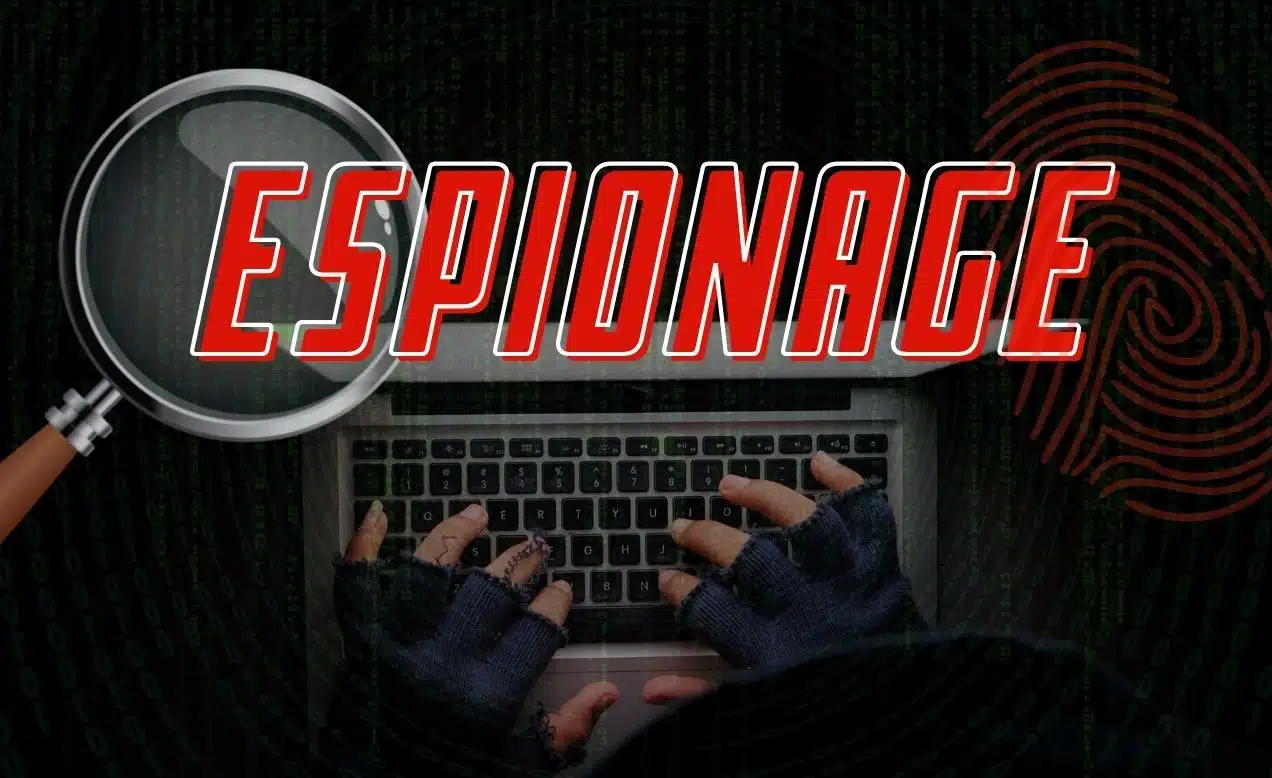
For an exciting game of social deduction, check out Espionage! This thrilling experience will put your team’s wits and instincts to the test.
Espionage! offers the following:
- a 90-minute session led by an experienced host
- undercover teams of agents and spies
- challenging puzzles, tasks, and maneuvers
- team conversations to help uncover secret identities
The best part is we will bring all the necessary game materials to your preferred location. If you are interested in boosting communication and critical-thinking skills within your team, then consider Espionage!
Learn more about Espionage!
2. Art Heist: The Vanishing of Van Gogh (Hosted)

You can turn your team into skilled detectives with Art Heist: The Vanishing of Van Gogh! In this captivating mystery, participants will locate the stolen artwork, The Bedroom.
Key features of this experience include:
- a 90-minute adventure led by a world-class host
- detailed puzzles, clues, and mysteries to unravel
- trails of evidence and hidden secrets
- group discussions to find the art
Additionally, you can include a cocktail kit to spice up your event. Through Art Heist, you will enhance your team’s ingenuity and problem-solving skills!
Learn more about Art Heist: The Vanishing of Van Gogh.
Get our free team building toolbox
- icebreaker games
- bingo cards
- DIY guides
 by teams at FedEx, Amazon, Deloitte and 73,930+ others
by teams at FedEx, Amazon, Deloitte and 73,930+ others

3. War of the Wizards (Popular)
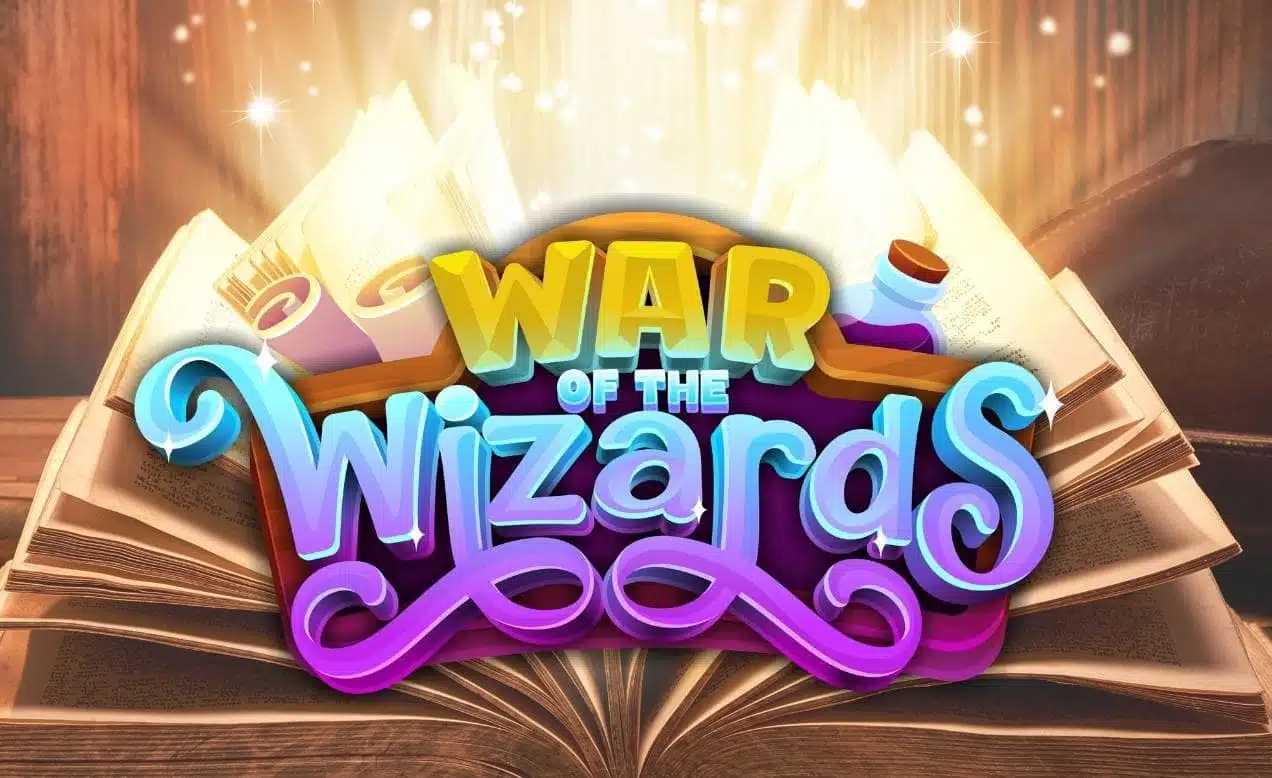
With War of the Wizards, teams roleplay as minions of powerful wizards to vanquish forces of evil. Participants will play thrilling games and go on a quest to restore harmony to the realm!
War of the Wizards offers the following:
- a 90-minute journey guided by a distinguished host
- immersive storytelling that transports players into a magical realm
- engaging activities like world-building, role-playing games, and storytelling
- opportunities for forming alliances, facing challenges, and going on quests
Through the power of imagination and teamwork, your team can overcome tasks and participate in an epic fantasy battle. To improve communication and bonds, include War of the Wizards in your agenda!
Learn more about War of the Wizards.
4. Sudoku
Sudoku is one of the most popular free problem solving games for adults. The objective of this game is to fill each box of a 9×9 grid so that every row, column, and letter contains each number from one to nine. The puzzle makes a great team challenge. To play Sudoku on Zoom, screen share the game board. Then, turn on the annotation features. Using the add text functions, participants can fill in the numbers on the grid.
We made a starter puzzle you can use in your next meeting or virtual team bonding session:
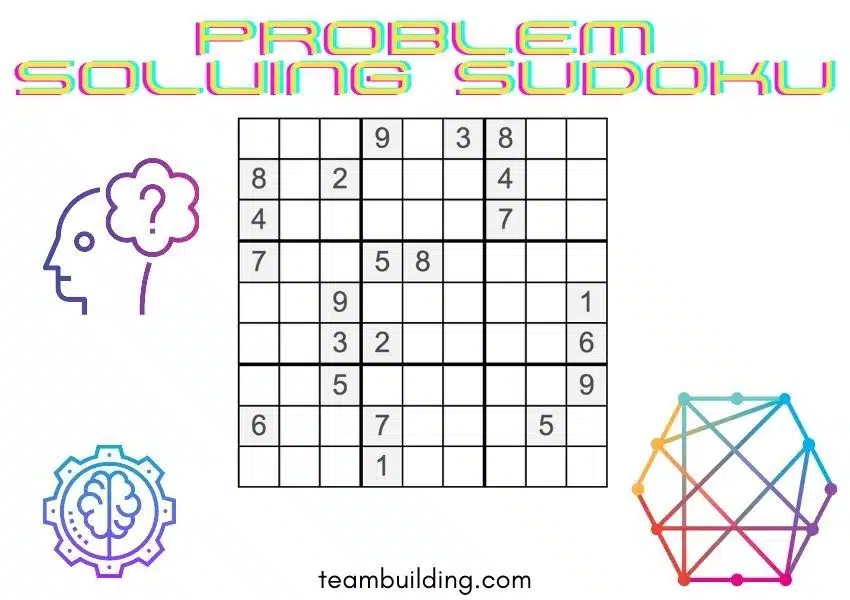
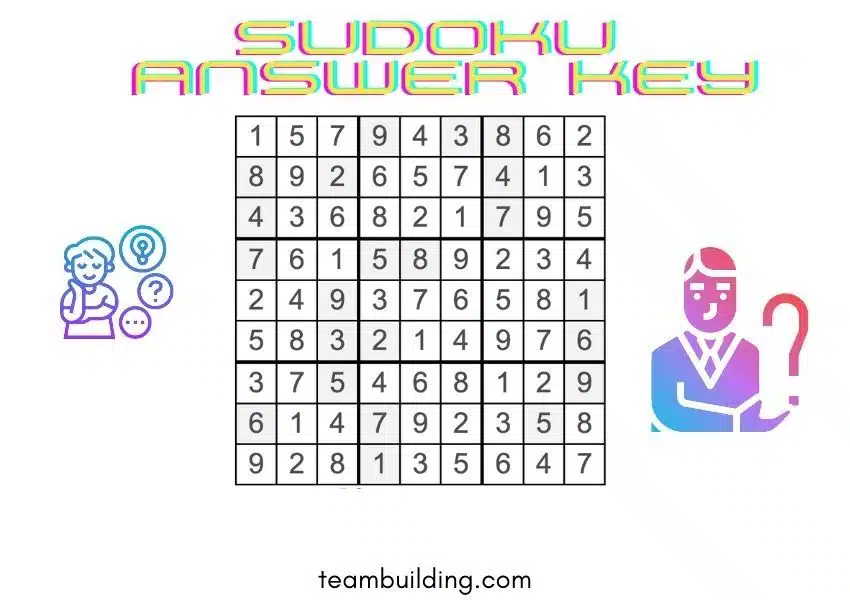
Here are more online Sudoku puzzles.
5. Crossword puzzles
Crossword puzzles are word games that ask players to fill in words based on clues. Words interconnect, and players must think critically about the surrounding words to select the right phrase for the space.
You can use an online crossword puzzle maker to create a custom puzzle. Here are a few themes you may want to consider:
- teammates’ tastes and interests
- company knowledge and history
- industry terms and trends
Or, create a miscellaneous puzzle just for fun.
We made a sample puzzle you can use for your game:
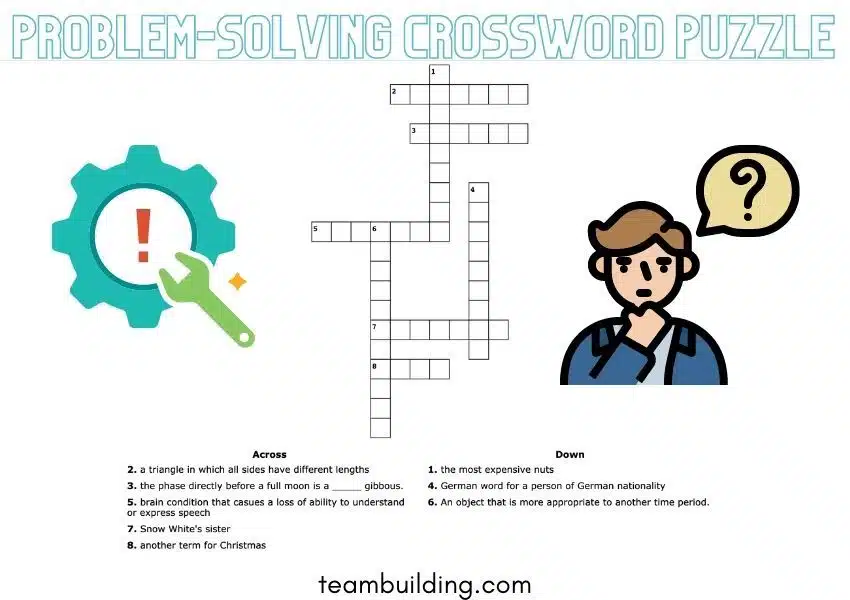
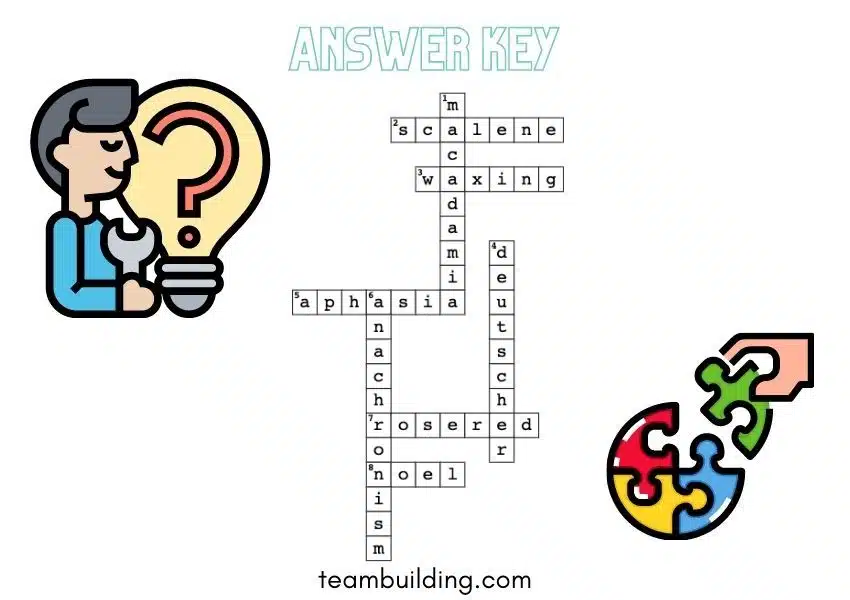
To complete puzzles during online meetings, you can use the share screen function and add text through annotations.
Or, subscribers can play the New York Times’ daily crossword puzzle virtually. Dictionary.com also offers a free daily online crossword puzzle.
Check out more vocabulary games.
6. Online Escape Rooms
Escape rooms are timed games that get groups working together to solve puzzles. Traditionally, players enter a locked room and must complete all puzzles in an hour or two to unlock the door. However, groups can also play escape rooms online.
Digital escape rooms typically come in one of two forms: in a Zoom room and led by a host, or in a choose-your-own adventure format via Google Forms or websites. To play escape rooms virtually, enter a video meeting and follow the prompts, or screen share the Google Form and work out the puzzles together.
Check out our full list of online escape rooms.
7. Murder Mysteries
Murder Mysteries are story-based games that ask players to take on the roles of suspects or detectives while trying to identify a killer. These games often involve reading lines from a script, searching for clues, and occasionally solving puzzles to get hints.
These games make participants pay attention to conversations, analyze other characters’ behavior, and search for hidden meaning in the script. Players must use their powers of observation and logic to unravel the mystery.
Check out our list of Zoom murder mystery games.
8. Treasure Hunts
Treasure hunts are scavenger hunts with intention. While virtual scavenger hunts often ask players to collect random items, treasure hunts require participants to locate clues that lead to other prompts and hints. The game typically ends with players finding a treasure or solving a mystery, sometimes both.
The treasure hunt can have a specific theme such as secret agent missions or a hunt for pirate treasure, or you can run a more general hunt. Teammates can either compete simultaneously via Zoom call, or can play the hunt on an app individually and compete to beat each other’s scores.
Check out our list of treasure hunt apps.
9. Poem or story challenge
Most team building problem solving activities for employees revolve around science, math, and logic. Poem/story challenges rely on writing skills and are sure to appeal to the language lovers on your team.
Each player receives a limited word bank to use to create a story or poem. Then, players have a few minutes to craft their pieces. Afterward, everyone reads out or screen shares their creations.
Here are a few word challenge activities you can do remotely:
- Found poems or stories: Participants make poems or stories out of words they find by visiting websites, searching emails, glancing out the window, or taking a walk or drive around the neighborhood.
- Random word generators: Teammates use a random word generator to populate a word bank, and must use each word in the poem or story.
- Poetry magnets: Group members make poems using poetry magnets. You can send poetry magnet sets to employees and assemble the verses on a cookie pan during a Zoom call. Or, teammates can play with poetry magnets online.
- Page poems: Participants receive one page of a book or magazine, and must make a poem or story by blocking out other words so only the chosen text remains visible. This activity is part storytelling, part art, since story crafters can illustrate the pages as part of the design.
- Ransom note stories or poems: Players cut out letters from magazines and must form new words to make poems and stories. Or, players can receive a mix of random letters, form words, and run the text through a ransom note generator.
These activities are suitable for teams and individual players.
10. Moral challenge
Some problems are ethical rather than factual. Moral judgment plays just as important a role in the decision-making process as technical prowess. Players can flex their moral problem-solving skills by tackling ethical dilemmas or social puzzles.
Here are some social problem solving games online:
To play these games, either download the apps, or pull up the website and then screen share the prompts. These games are best played when discussed as a group, because the more belief systems and opinions, the harder an issue is to resolve. These exercises provide practice for real-life conflict resolution.
You can find similar challenges on our list of online personality tests.
11. Frostbite
Frostbite is a group game that hones team leaders’ communication skills while sharpening teammates’ listening and cooperation skills. The premise behind the game is that a group of explorers gets caught in a snowstorm and must build a shelter. Frostbite has paralyzed the leaders’ hands and snow-blinded the rest of the team. The leader must give the team instructions to build a tent that can resist arctic winds.
To play Frostbite, each teammate wears a blindfold. Then, the leader gives directions. Once the structures are complete, players turn on a fan to test whether tents can withstand the wind.
Frostbite is usually an in-person game, however you can also play virtually. In the remote version of the game, teammates construct tents out of cards and tape, while the leader surveys the scene on screen.
This exercise demonstrates the challenges of leading remotely, as teams need to operate with minimal oversight or supervisor observation. Therefore, instructions need to be clear and direct to be effective.
Check out more team building games.
12. Virtual Hackathons
Hackathons are events where participants have a set amount of time to design and pitch a new product or solution. This type of event originated in the programming world and is often used to create new apps, however you can apply the game to any industry or school subject.
Virtual hackathons are online versions of the event. Teams enter the competition, then work with each other via virtual meeting software or remote work communication platforms to design the solution. At the end of the competition, teams pitch ideas to a panel of judges and a winner is decided.
To run a virtual hackathon, first announce the theme of the event and collect sign-ups. So that no teams work ahead, hint at the general idea of the issue, and only explain the precise problem when the event begins. Then, give teams anywhere from a few hours to a few days to complete the project.
Discover more virtual hackathon ideas.
13. Improv games
Improv games are excellent problem solving activities. These exercises force participants to think and respond quickly to keep scenes moving in a logical and entertaining way.
Here are some good problem solving improv games:
Banned words: Performers cannot say certain words. Scene partners will conceive of situations that encourage the actors to use those words, and the actors must find alternatives, such as using synonyms or taking the scene in a new direction.
Scenes from a chat: Audience gives a suggestion for a scene, and players act the scene out. Though it’s a fictional and often ridiculous scenario, actors must react to the situation and solve the problem in order for the scene to end.
Miracle cure: Miracle cure is a quick-moving exercise that follows a simple format. One player declares, “I have a problem.” Another player responds, “I have a….[random object.]” The first player then replies, “great! I can use the [random object] to….” and describes how they will solve the problem.
Check out more problem-solving improv games.
14. Spaghetti Tower
The spaghetti tower is a classic team building game. Participants gather uncooked spaghetti and marshmallows, and must construct the tallest freestanding tower.
During the in-person version, players must construct one tall freestanding tower. However, for the virtual version of the game, players construct individual towers. You can send groups to breakout rooms for the build, then reconvene in the main room for judging. Teams are judged on three main factors: number of towers, height, and uniformity.
This version of the game not only tests the structural integrity of the tower, but also consistency and quality control. This exercise teaches teams to align and collaborate remotely, and produce a consistent product even when far apart.
15. What Would You Do?
What Would You Do? is a simple situational game that challenges participants to react to different circumstances. To play this game, read prompts one by one, and then ask participants to respond with gameplans. You can use the polling or raise hand feature to vote for the best option.
Here are some problem solving scenarios for adults or kids to use in the game:
- Zombies attack and you have to find a place to hide.
- You are at the zoo and the animals escape. Which one do you try to corral back into the pen first?
- After waiting in line for hours, someone cuts in front of you last minute. The person appears to be visually and hearing impaired, and doesn’t notice your protests. An official announces that due to diminishing supply, this individual will be the last in line to be served.
- You are eating a meal with important clients and/or your partner’s parents, and you want to impress. The individuals make you a dish that does not fit within your dietary restrictions, but you do not speak the same language and cannot explain why you do not want to eat.
- An imposter has infiltrated the organization, who looks, speaks, and behaves exactly like you. How do you convince your peers that you are the original?
For similar dilemmas, check out this list of Would You Rather? questions.
16. Desert Island Survival
Desert Island Survival is a game that challenges players to prioritize. The premise is that players have been stranded on an island, and must decide what order to perform survival steps.
Here are the possible actions:
- Rest
- Find food
- Find water
- Set up shelter
- Explore the island
- Try to signal for help
- Make weapons for self-defense
- Build a raft to escape the island
- Start a fire
- Choose a group leader
- Search for other survivors
All group members must agree on the order of the steps. Players should explain the reasoning for the order of each step while ranking the actions.
Another version of the game involves players receiving a list of 15 to 20 items, and selecting five or so to bring to the island. You can also vary the location of the game, substituting remote islands for destinations like outer space or the distant past.
17. Choose Your Own Adventure
Choose Your Own Adventure stories enable readers to determine the outcome of the story by making decisions. Each action has a consequence that takes the tale in a different direction. Participants can try to guess how the story may unfold by talking through the different choices. When completing the activity in a group setting, the majority of the team must agree on an action before moving forward in the story.
There are a few ways to facilitate these activities online:
- Play an online role playing video game
- Watch an interactive movie like Black Mirror: Bandersnatch
- Read from a Choose Your Own Adventure book on Zoom
- Click through a Choose Your Own Adventure platform
- Create your own story using a Google Form
Whichever way you choose to do the exercise, you can use the screen share feature in your virtual meeting software so that listeners can more easily follow along.
18. MacGyver
MacGyver is a show where the hero escapes sticky situations by improvising tools out of unlikely materials. For example, in one episode the hero makes a telescope out of a newspaper, magnifying lens, and a watch crystal.
To play MacGyver, you can either list three to five objects participants can use, or challenge players to use items that are within arms reach.
Simply state a desired end result, such as “a way to open a locked door,” or “a getaway vehicle,” and then ask teams to explain what they will build and how they will build it. To make the activity more collaborative, you can give teams five or ten minutes in breakout rooms to strategize and design a prototype.
19. Dungeons & Dragons
Dungeons & Dragons is a roleplaying game where players pretend to be magical figures and creatures. One player serves as the dungeon master, who guides the game, while the other players pick characters and make decisions to move the story forward. Upon choosing a course of action, players roll a twenty-sided die to determine whether or not the plan succeeds. The game is story-based, the possibilities are nearly limitless, and truly creative problem solving options arise. Also, since gameplay is mostly verbal, Dungeons & Dragons is an easy activity to do over Zoom.
Here are the basic rules for Dungeons & Dragons.
20. Pandemic
Pandemic is a game that pits players against the forces of nature in a race to contain and control disease outbreaks. At the beginning of the game, each player receives a role such as containment specialist or operations expert. Participants must carry out the duties of their roles by choosing appropriate actions. Pandemic is a great game for groups because each team member has a clear part to play, and players must collaborate and work together instead of competing against each other.
To play the game online, you can use a Pandemic game app, or talk through the exercise while one attendee moves and displays pieces on the board.
Note: The subject of this game might hit too close to home for some players, considering recent history. You can find games with similar mechanics that deal with different subject matter, such as Forbidden Island.
Check out more team building board games.
21. Model UN
Model UN is one of the best virtual problem solving activities for students. This exercise casts participants in the role of international diplomats who must negotiate to solve realistic problems. Each player assumes the role of a country ambassador and must form alliances and propose solutions to solve crises.
Here are some sample Model UN scenarios:
- Human rights violation by powerful country
- Food shortage
- Poaching
- Piracy
- Disease epidemic
- Technology privacy violations
- Civil war branching into surrounding countries
- Natural disasters
Depending on the size of the group, participants either take on the part of an entire government of a country, or play a certain role within the government. To carry out the activity on Zoom, players can take turns giving speeches, message other countries privately via the chat, meet in breakout rooms to form alliances or have more intimate discussions, and use the polling feature to vote on propositions.
If politics does not resonate with your group, then you can alter the exercise by applying the same activity structure to a different theme, such as the Justice League, movie characters, business board members, or reality TV stars.
The main purpose of the exercise is to research, talk through problems, and compromise. As long as these elements are present, then the specifics of the setup do not matter.
Conclusion
There are many types of problem solving activities for adults. You can do online problem solving games, which require a different skill set than in-person problem solving. For instance, communication must be much clearer and more abundant when group members are far apart and unable to demonstrate or pick up physical cues.
Though many problem solving games include props and in-person elements, there are many games you can play together online. These exercises work well as educational tools as well as team bonding accelerators. Upon completion, participants are likely to feel a sense of accomplishment and increased confidence. These games are also great practice for real life conflict resolution, creative thinking and team building.
Next check out this list of connection games, this collection of crime-solving games, and this post with conflict resolution games.
We also have a list of the best decision making books and a list of team building problems for work.





You missed chess… Now that’s problematic!